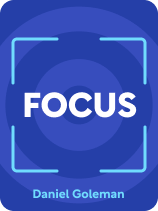

This article is an excerpt from the Shortform book guide to "Focus" by Daniel Goleman. Shortform has the world's best summaries and analyses of books you should be reading.
Like this article? Sign up for a free trial here.
Are digital games good or bad for you? What’s an effective way to monitor your own thoughts?
Focus can be trained. In his book Focus, Daniel Goleman discusses two practical (even enjoyable) ways to strengthen your various attention skills. In particular, he shows how digital games and meditation can lead to sharper focus.
Continue reading for some practical advice on how to train your focus.
How to Train Your Focus
You can strengthen your self-awareness, willpower, social awareness, and systems awareness by improving your selective attention skills. Focus training exercises help build connections between neurons; the more neural connectivity you have, the stronger your attention. In Goleman’s discussion of how to train your focus, he shows that digital games and meditation can serve as effective training activities.
(Shortform note: Attention is thought to rely on communication and coordination between different brain regions, and having more connections between these regions may facilitate this communication and coordination. Repeated activation of the neurons, or nerve cells over time, like in attention training exercises, can lead to the formation of new connections or the strengthening of existing ones. The more neurons communicate with one another this way, the stronger the bond between them becomes, which may play a role in your attentional abilities.)
Digital Games
Goleman notes that, while video games are typically regarded as distractions, they can also play a role in training your brain for attention skills. Research has shown that games can improve certain cognitive and attention skills, such as visual attention, object tracking, speed of processing information, switching attention from one thing to another, and increased memory capacity.
Goleman writes that some games are better than others at training your brain for useful attention skills. Targeted games are designed to train specific aspects of attention, like ignoring distractions and resisting impulses. Such games are better for strengthening skills you use in your daily life, as opposed to commercial video games, which might train your brain in, for example, object tracking, which is less useful in the real world.
(Shortform note: Lumosity and NeuroNation are a few examples of targeted games. Importantly, many of these games are marketed for adults, and if you hope to use digital games to support growth in your child’s attention skills, you should try to find ones that they actually find enjoyable to play. It’s also important to note that video games should be used in moderation, as excessive screen time can negatively impact overall health and well-being.)
Meditation
Goleman also recommends meditation as a powerful way to train and improve your attention. Goleman focuses on mindfulness meditation, which he describes as a practice of paying attention to our thoughts, letting them go, and directing our attention back to the present moment. In doing so, you can develop the capacity to sustain your attention in the here and now without getting swept away by wandering thoughts, ruminations, or outside distractions.
(Shortform note: The book doesn’t clearly explain that mindfulness is a state of sustained and relaxed awareness and that meditation is a method you can use to achieve mindfulness. Goleman conflates the two, but it is important to know that you can practice mindfulness anytime while doing anything, and meditation is a powerful tool to cultivate a mindful state of mind.)
Goleman writes that mindfulness develops the capacity of selective attention through the practice of directing your attention from one thing to another, staying with the new object of focus, and ignoring distractions. Other positive effects include greater self-awareness and empathy and stronger meta-awareness, which helps you monitor your own thoughts and get back on task.
(Shortform note: In addition to improving selective attention (as it is defined outside of the book), mindfulness can improve your capacity for sustained attention— the ability to sustain your focus on one thing for extended periods of time. It can also strengthen your attentional control—your ability to switch your attention between different tasks or stimuli, which can be useful in situations that require task-switching or adapting to changing demands.)
To develop this capacity, you can practice meditation by focusing your attention on your breath or on your sensory experience (for example, focusing only on the sounds you are hearing or the sensations you feel on your skin). Goleman contends that improvements can be seen in as little as twenty minutes a day for four days, but, the more consistently you practice, the better your results will be.
(Shortform note: Meditation isn’t the only way you can monitor your thoughts and get back on track. Bailey outlines a method of tracking your attention and developing greater meta-awareness through setting what he calls an “hourly awareness chime.” With this method, you set an alarm that repeats throughout the day as a reminder to come back to the present moment and check where your attention is.)

———End of Preview———
Like what you just read? Read the rest of the world's best book summary and analysis of Daniel Goleman's "Focus" at Shortform.
Here's what you'll find in our full Focus summary:
- How to understand, strengthen, and use your attention to lead a more fulfilling life
- The three directions you can aim your attention: inward, toward others, and outward
- How spending time in nature restores your attention






